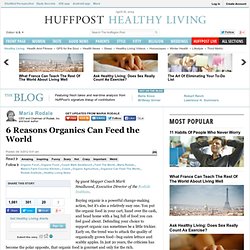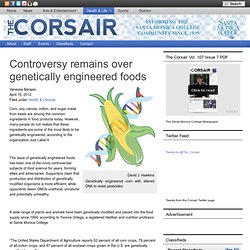

The Grocery Store That's Changing the Food System. Whole Foods has become the first grocery store in the nation to require labeling of GMO foods. Big news for people concerned about avoiding genetically modified organisms (GMOs): Whole Foods, the nation's largest natural and organic foods retailer, has just announced that by 2018, all products sold in its stores must indicate whether they contain GMOs. "We're responding to our customers, who have consistently asked us for GMO labeling and we are doing so by focusing on where we have control: in our own stores," said Walter Robb, co-CEO of Whole Foods Market, in a statement about the company's move.
The move could have a huge impact on the U.S. food system. Approximately 90 percent of all corn, soy, and canola grown in the U.S. is genetically modified, that is, it's had its DNA altered to withstand high levels of pesticides that kill weeds and insects. Surprise! Now that Whole Foods has made labeling mandatory, finding GMO-free foods could become a lot easier. 1. 2.
GMO_Myths_and_Truths_1.1.pdf (application/pdf Object) GMO Labelling: What Does Labelling Look Like? Peru Passes Monumental Ten Year Ban on Genetically Engineered Foods. In a massive blow to multinational agribiz corporations such as Monsanto , Bayer, and Dow, Peru has officially passed a law banning genetically modified ingredients anywhere within the country for a full decade before coming up for another review. Peru’s Plenary Session of the Congress made the decision 3 years after the decree was written despite previous governmental pushes for GM legalization due largely to the pressure from farmers that together form the Parque de la Papa in Cusco , a farming community of 6,000 people that represent six communities. They worry the introduction of genetically modified organisms (GMOs) will compromise the native species of Peru, such as the giant white corn, purple corn and, of course, the famous species of Peruvian potatoes. Anibal Huerta, President of Peru’s Agrarian Commission, said the ban was needed to prevent the ”danger that can arise from the use of biotechnology.”
Note: This decree was signed into effect on April 15th 2011 ASPEC Study. CNN Hero of the Year 'Mother Robin' Warns that GMOs May Cause Widespread Umbilical Cord Deformities. Genetic engineering: The world's greatest scam?
Business. Health. Agriculture. Monsanto. GMO_Myths_and_Truths_1.3.pdf (application/pdf Object) Maria Rodale: 6 Reasons Organics Can Feed the World. By guest blogger Coach Mark Smallwood, Executive Director of the Rodale Institute.

Buying organic is a powerful change-making action, but it's also a relatively easy one. You put the organic food in your cart, hand over the cash, and head home with a bag full of food you can feel good about. Defending your choice to support organic can sometimes be a little trickier. Early on, the trend was to attack the quality of organically grown food--bug-eaten lettuce and scabby apples. In just 20 years, the criticism has become the polar opposite, that organic food is gourmet and only for the rich. The latest "feed the world" scare tactic has been a really good way for Big Ag folks to shut down arguments for any agricultural path other than the one they promote.
Here are a couple of good sound bites to throw back the next time friends, family members, or even strangers tell you we need super-chemicals and GMOs to feed the world: The Corsair : Controversy remains over genetically engineered foods. Corn, soy, canola, cotton, and sugar made from beets are among the common ingredients in food products today.

However, many people do not realize that these ingredients are some of the most likely to be genetically engineered, according to the organization Just Label It. The issue of genetically engineered foods has been one of the more controversial subjects of food science for years, forming allies and adversaries. Supporters claim that production and distribution of genetically modified organisms is more efficient, while opponents deem GMOs unethical, unnatural and potentially unhealthy. A wide range of plants and animals have been genetically modified and placed into the food supply since 1994, according to Yvonne Ortega, a registered dietitian and nutrition professor at Santa Monica College.
GMOs include foods that have received at least one gene unnaturally, according to “Campbell Biology: Concepts and Connections,” a textbook used in SMC biology classes. Biology News, Videos, Reviews and Gossip - io9. A Must-Read for Every Canadian – A Letter from an Alberta Grain Farmer. To Environmental Groups From an Alberta Grain Farmer Nov. 27, 2011 I am a Canadian wheat and barley producer; who values and respects democratic process.

I want to protect the environment, preserve wild life habitat and I am very concerned about climate change. The Harper government is intent on destroying our Canadian Wheat Board (CWB) (BillC-18) before Canadians have time to become aware of the negative effects this fundamental change to grain marketing will have on the environment and many other aspects of Canadian life and our food. 1. 2. 3. 4.